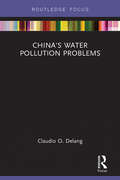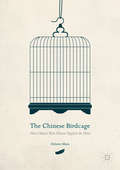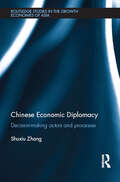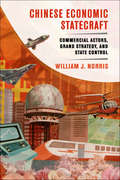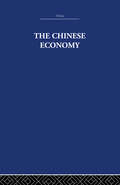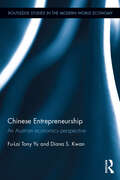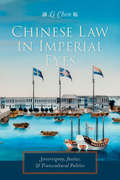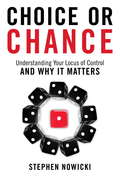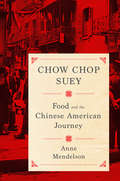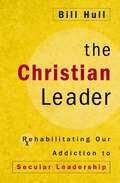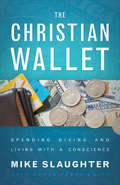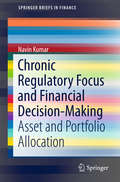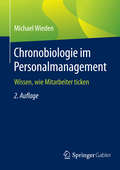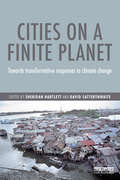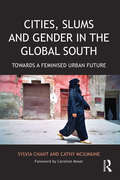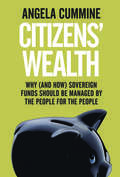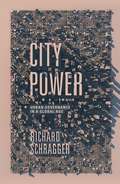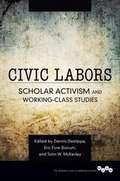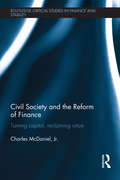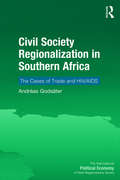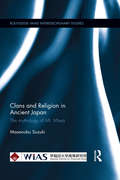- Table View
- List View
China's Water Pollution Problems
by Claudio O. DelangWater pollution is one of the most serious problems plaguing China today with millions of citizens drinking water unfit for consumption. These abysmal conditions have fuelled increasing social discontent, as people become more concerned by the need to address the pressing issues of water pollution, scarcity, and waste management. This book describes how and why China has ended up in such a dire situation, what the government is doing to address the problem and the difficulties encountered in attempting to reduce pollution. The analysis is based on both gray literature (newspaper articles, NGO reports, Chinese government information) and on academic studies. The gray literature gives a voice to those who suffer from the pollution, their advocates, and government officers, and allows the reader to better grasp the conditions on the ground, and the impact of the air pollution among the people in different areas in China. The academic literature adds a theoretical perspective and brings these different case studies into a broader context. This book will be of great interest to students of environmental pollution and contemporary Chinese studies looking for an introduction to the topic, as well as researchers looking for an analysis of China's environmental problems.
The Chinese Birdcage
by Heleen MeesThis book vividly describes how China's rise in the early 2000s led to rising profits and declining labor income everywhere, ultimately resulting in the global financial crisis. Under Deng Xiaoping's policy of 'reform and opening up' in the 1980s, China quickly became the world's factory floor. . . but powerful political leaders envisioned a world in which the market economy would be trapped within the confines of a planned economy. With China's admission into the World Trade Organization in 2001, almost a billion people joined the global workforce, driving down the real wages of blue- and white-collar workers in the US and Europe while also lowering interest rates, which fueled housing bubbles and destabilized the financial sector. This book explores China's significant influence on western economies by focusing on the links between the labor market, corporate profits, and interest rates, using Arthur Lewis's framework for economic growth with unlimited supplies of labor to argue that by 2010 the world economy - and political situations - had been set back almost one hundred years.
Chinese Economic Diplomacy: Decision-making actors and processes (Routledge Studies in the Growth Economies of Asia)
by Shuxiu ZhangEconomic diplomacy was declared in 2013 by Beijing as a priority in its "comprehensive" strategy for diplomacy. The political elite undertook to further invest in economic diplomacy as an instrument for economic growth and development. Globally, Chinese cooperation in multilateral economic processes has become critical to achieving meaningful outcomes. However, little understanding exists in current literature on the factors and mechanisms which shape the processes behind China’s economic diplomacy decision-making. Chinese Economic Diplomacy provides an understanding of the processes and practices of China’s economic diplomacy, with multilateral economic negotiations as the primary basis of analysis, specifically the UN climate change talks and the WTO Doha Round trade negotiations. It examines how early economic diplomacy in global governance contributed to the varied and evolving nature of its present-day decision-making structures and processes. Demonstrating how China’s negotiation preferences are driven by networks of political actors in formal and informal domestic and systemic environments, it also highlights the capacity of international negotiation practices to alter and re-shape China’s approach to multilateral economic negotiations. As a consequence, the book presents a framework for understanding China’s economic diplomacy decision-making processes that is systemically constructed by domestic and international agencies. Offering a Chinese perspective of the notion of economic diplomacy, this book will be of interest to students and scholars of Chinese Economics, International Relations and Political Economy.
Chinese Economic Statecraft: Commercial Actors, Grand Strategy, and State Control
by William J. NorrisIn Chinese Economic Statecraft, William J. Norris introduces an innovative theory that pinpoints how states employ economic tools of national power to pursue their strategic objectives. Norris shows what Chinese economic statecraft is, how it works, and why it is more or less effective. Norris provides an accessible tool kit to help us better understand important economic developments in the People's Republic of China. He links domestic Chinese political economy with the international ramifications of China’s economic power as a tool for realizing China’s strategic foreign policy interests. He presents a novel approach to studying economic statecraft that calls attention to the central challenge of how the state is (or is not) able to control and direct the behavior of economic actors. Norris identifies key causes of Chinese state control through tightly structured, substate and crossnational comparisons of business-government relations. These cases range across three important arenas of China’s grand strategy that prominently feature a strategic role for economics: China’s efforts to secure access to vital raw materials located abroad, Mainland relations toward Taiwan, and China’s sovereign wealth funds. Norris spent more than two years conducting field research in China and Taiwan during which he interviewed current and former government officials, academics, bankers, journalists, advisors, lawyers, and businesspeople. The ideas in this book are applicable beyond China and help us to understand how states exercise international economic power in the twenty-first century.
The Chinese Economy
by Solomon AdlerFirst published in 1957.This volume provides a broad survey of economic progress in China from 1949 to 1952 and covers the historical background, China's economic system, industralisation and planning, the first Five Year Plan in industry, agriculture, transport, commerce and finance, education and health and foreign trade. The work is supplemented with an extensive bibliography, maps and statistical tables.
Chinese Entrepreneurship: An Austrian economics perspective (Routledge Studies in the Modern World Economy)
by Fu-Lai Tony Yu Diana S. KwanAfter more than 30 years of reformations in agriculture, manufacturing and trade and industry, China’s economy has grown to become the second largest in the world. This book examines the contributions of dynamic entrepreneurs to the economic development of mainland China and Hong Kong – an analysis that is largely lacking in existing studies China’s economic stronghold. This book adopts theories of entrepreneurship and market processes as major analytical frameworks to conclude that entrepreneurship is the true engine of growth in mainland China and Hong Kong. Chinese Entrepreneurship focuses on the knowledge drivers and systemic challenges of these businesses to examine how entrepreneurs under uncertainty identify and pursue profit opportunities, and how their efforts have enhanced China’s economic dynamics. This book offers vital insight to students, teachers and researchers of Chinese business and economics, along with Chinese culture and expanding economies.
Chinese Law in Imperial Eyes: Sovereignty, Justice, and Transcultural Politics (Studies of the Weatherhead East Asian Institute, Columbia University)
by Li ChenHow did American schoolchildren, French philosophers, Russian Sinologists, Dutch merchants, and British lawyers imagine China and Chinese law? What happened when agents of presumably dominant Western empires had to endure the humiliations and anxieties of maintaining a profitable but precarious relationship with China? In Chinese Law in Imperial Eyes, Li Chen provides a richly textured analysis of these related issues and their intersection with law, culture, and politics in the eighteenth and nineteenth centuries.Using a wide array of sources, Chen's study focuses on the power dynamics of Sino-Western relations during the formative century before the First Opium War (1839-1842). He highlights the centrality of law to modern imperial ideology and politics and brings new insight to the origins of comparative Chinese law in the West, the First Opium War, and foreign extraterritoriality in China. The shifting balance of economic and political power formed and transformed knowledge of China and Chinese law in different contact zones. Chen argues that recovering the variegated and contradictory roles of Chinese law in Western "modernization" helps provincialize the subsequent Euro-Americentric discourse of global modernity.Chen draws attention to important yet underanalyzed sites in which imperial sovereignty, national identity, cultural tradition, or international law and order were defined and restructured. His valuable case studies show how constructed differences between societies were hardened into cultural or racial boundaries and then politicized to rationalize international conflicts and hierarchy.
Choice or Chance
by Stephen NowickiHow Much Do You Believe That What Happens to You Is the Result of Your Own Actions--or Do Circumstances Beyond Your Control Largely Determine Your Fate?Locus of Control (LOC) is a phrase used by psychologists to describe a widely effective way of assessing an individual's potential for success--personal, social, and financial. LOC measures how much you believe what happens to you is the result of your own actions or, conversely, of forces and circumstances beyond your control. People who accept that they are largely in control of their lives tend to do better than those who feel that fate or external factors rule what they do, especially in novel and difficult situations.This book explains LOC research, until now mainly confined to academic circles, in terms easily understandable to the average person. The author, a clinical psychologist who has spent nearly five decades investigating and writing about LOC, helps the reader to explore his or her own locus of control and what those orientations might mean for how life is lived. He discusses the extensively documented relationship between LOC and academic achievement, personal and social adjustment, health, and financial success. Dr. Nowicki notes that there has been an increasing tendency among Americans to feel as though their lives are slipping out of their control, and he identifies ways to reverse this negative trend.He describes how the Locus of Control is learned and demonstrates ways in which it can be changed to yield higher levels of achievement, success, personal satisfaction, and better interactions with others.From the Trade Paperback edition.
Choice, Preferences, and Procedures
by Kotaro SuzumuraSocial choice theory critically assesses and rationally designs economic mechanisms for improving human well-being. Kotaro Suzumura--one of the world's foremost thinkers in social choice theory and welfare economics--fuses abstract ideas with real-world economies to examine foundational issues of normative economics and collective decision making.
chotuKool: "Little Cool," Big Opportunity
by Rory Mcdonald Derek Van Bever Efosa OjomoGodrej & Boyce Manufacturing Company Limited is one of the companies owned by Godrej Group, an Indian conglomerate with annual turnover of more than $4 billion. After learning about disruptive innovation and prompted by the strategic vision of Jamshyd Godrej (managing director and chairman of the board at Godrej & Boyce Mfg. Co.), Godrej & Boyce decided to target the 80 percent of Indians who did not have access to conventional refrigerators with a product called chotuKool. This case chronicles the journey that Godrej & Boyce engineers and product managers went through to develop chotuKool and their experience selling to a market the company typically does not target with appliances. It introduces students to disruptive innovation from the point of view of a multi-billion company.
chotuKool: "Little Cool," Big Opportunity
by Efosa Ojomo Rory McDonald Derek C.M. van BeverIn 2013, a team led by Gopalan Sunderraman, vice president of corporate development at Godrej & Boyce Mfg. Co. Ltd.-one of the companies owned by Godrej Group, a large Indian conglomerate-was preparing to launch an innovative low-cost refrigerator. Developed expressly for the approximately 80% of Indians who lacked access to refrigeration (a market Godrej had never before targeted), the chotuKool represented a technological marvel-a small, inexpensive thermoelectric appliance powered by a rechargeable battery. The case traces chotuKool's development and evolution from an initial product concept inspired by theories of innovation and the strategic vision of Jamshyd Godrej (managing director and chairman at Godrej & Boyce Mfg.) to a promising new line of business that emerged from a process of learning and discovery through market feedback. As the company geared up for the broader rollout of chotuKool, Sunderraman and his team faced some tough questions. What was the proper target and scope for the launch? Which strategy gave them the best chance of success? Could chotuKool really redefine the company and bring refrigeration to hundreds of millions of Indians?
Chow Chop Suey: Food and the Chinese American Journey (Arts and Traditions of the Table: Perspectives on Culinary History)
by Anne MendelsonChinese food first became popular in America under the shadow of violence against Chinese aliens, a despised racial minority ineligible for United States citizenship. The founding of late-nineteenth-century "chop suey" restaurants that pitched an altered version of Cantonese cuisine to white patrons despite a virulently anti-Chinese climate is one of several pivotal events in Anne Mendelson's thoughtful history of American Chinese food. Chow Chop Suey uses cooking to trace different stages of the Chinese community's footing in the larger white society.Mendelson begins with the arrival of men from the poorest district of Canton Province during the Gold Rush. She describes the formation of American Chinatowns and examines the curious racial dynamic underlying the purposeful invention of hybridized Chinese American food, historically prepared by Cantonese-descended cooks for whites incapable of grasping Chinese culinary principles. Mendelson then follows the eventual abolition of anti-Chinese immigration laws and the many demographic changes that transformed the face of Chinese cooking in America during and after the Cold War. Mendelson concludes with the post-1965 arrival of Chinese immigrants from Taiwan, Southeast Asia, and many regions of mainland China. As she shows, they have immeasurably enriched Chinese cooking in America but tend to form comparatively self-sufficient enclaves in which they, unlike their predecessors, are not dependent on cooking for a white clientele.
The Christian Leader: Rehabilitating Our Addiction to Secular Leadership
by Bill Hull Robby Gallaty<P>From the author of the best-selling book The Disciple-Making Pastor comes a call to Christian leaders to let go of their addiction to secular models of leadership rooted in pragmatic success.<P> Most leadership literature talks about having the “right kind” of leadership personality.<P> You know the type: big-picture visionaries who serve others and get the best out of people.<P> But the popular pattern of doing what works and getting rewarded for it is actually the enemy of Christian leadership. <P>It thrives on making our work impersonal and exploitive.<P> Far too often, it serves the leader rather than those the leader leads.<P> Sadly, this pattern dominates Christian leadership in the West.<P> We need a different style of leadership — one patterned after Jesus. Jesus influenced others because of who he was, not because he was well-known or a person of power or because he had mastered a set of skills or implemented an effective leadership strategy.<P> He could have completed his mission living in your house, driving your car, married to your spouse, working at your office, and raising your kids because leadership comes down to character.<P> Many who aspire to leadership are looking for the right circumstances so they can lead. <P>Many in positions of leadership find it difficult to lead because of obstacles, such as a lack of funds, authority, and or confusion about methods. Jesus faced all of these — and more — yet he accomplished his mission.<P> This is not a book about improving Christian organizations; it is about changing how Christians lead.<P> It is for anyone with a megaphone, a platform to speak, who wants to lead others in being a witness for truth. It is for people with a pulpit, whether that pulpit be a business or a position of influence in a domain of the culture: entertainment, sports, politics, industry, the arts, academia, or religion.<P> If you are someone to whom others listen— this book is for you.<P> Each chapter begins with a title and statement about Jesus’ life. <P>Jesus was a different kind of teacher.<P> The Pharisees focused on doing the right thing. Jesus emphasized becoming the kind of person who wants to do the right thing. <P>Others taught the importance of doing good; Jesus taught how to be good. <P>He didn’t teach behavior modification alone; he taught how to change the sources of behavior.<P> Knowing how to lead others begins by seeing Jesus as your leader.
The Christian Wallet: Spending, Giving, And Living With A Conscience
by Mike SlaughterEvery Christian knows that we are called to love God with all our heart, mind, soul, and strength. But what about our wallet? We are asked to open it every Sunday when the offering basket comes by and are told that giving is a way of being a "good steward," but what about spending money at a restaurant or grocery store? Best-selling author Mike Slaughter offers a comprehensive look at how Christians use their money in The Christian Wallet. Slaughter explores today's culture of consumerism and the impact of what we buy, asking difficult questions about morality and money.The Christian Wallet helps Christians grapple with important questions about stewardship: how we spend, how we live, how we save, how we give, and what it all means. Questions for individual or group study are also included with each chapter.
Chronic Regulatory Focus and Financial Decision-Making: Asset and Portfolio Allocation (SpringerBriefs in Finance)
by Navin KumarIn this book, the relationship between financial decision-making and chronic regulatory focus is explored to provide a better understanding of consumer decisions. Financial decisions are modelled on the basis of assets and portfolios sensitive to particular regulatory foci. Studies in the book test whether participants select assets/portfolios that conform to their respective foci. In addition, given that gender, age and education can shape financial decisions, further hypotheses are put forth to explore whether these are related to asset and portfolio selection and regulatory focus. As consumers tend to make financial decisions prior to priming, this book diverts from previous research involving primed states of regulatory focus and instead explores the chronic state. The study employs two complementary instruments, the eye tracker and self-report, to explicate the hypotheses. As the main hypotheses were not supported, the author posits that the harsh worldwide financial climate may have acted as an external influence, moving participants to select assets and portfolios not aligned with their foci. This study marks a valuable contribution to the current literature concerning financial decision-making, the underlying motivational systems and external influences, and will promote further research in these areas. It offers an essential resource for academics and students interested in how regulatory focus interacts with financial decisions and the overarching economic climate.
Chronobiologie im Personalmanagement: Wissen, wie Mitarbeiter ticken
by Michael WiedenDieses Fachbuch zeigt Wege auf, wie innovative Führungsansätze zu neuer Produktivität und einer Win-win-Situation für alle Beteiligten führen können. Gegenüber der ersten Auflage wird in dieser zweiten, inhaltlich erweiterten Auflage das große Potenzial, das in der Nutzung der Erkenntnisse aus der Chronobiologie liegt, intensiver beleuchtet. Michael Wieden erläutert, wie sich mit dem Wissen um das Ticken der genetisch bedingten inneren Uhr das Wesen des Arbeitens, dessen Wert, aber auch das Verständnis von Lebensqualität in den kommenden Jahrzehnten nachhaltig verändern werden und alle Prozessbeteiligten davon profitieren können.
Cities and Spaces of Leadership: A Geographical Perspective (International Political Economy Series)
by Cristina D'Alessandro Frannie LéautierCristina D'Alessandro and Frannie Léautier investigate the interaction between leaders and the various spaces and places in which they work and live. Rooting their work in a critical understanding of the global contemporary world, they combine human geography and leadership theories throughout the book. Referring to the trajectories of global leaders, Cities and Spaces of Leadership is a unique and unprecedented achievement that should be read by geographers, leaders, and academics concerned by contemporary social, political and economic dynamics.
Cities on a Finite Planet: Towards transformative responses to climate change
by Sheridan Bartlett David SatterthwaiteCities on a Finite Planet: Transformative responses to climate change shows how cities can combine high quality living conditions, resilience to climate change, disaster risk reduction and contributions to mitigation/low carbon development. It also covers the current and potential contribution of cities to avoiding dangerous climate change and is the first book with an in-depth coverage of how cities and their governments, citizens and civil society organizations can combine these different agendas, based on careful city-level analyses. The foundation for the book is detailed city case studies on Bangalore, Bangkok, Dar es Salaam, Durban, London, Manizales, Mexico City, New York and Rosario. Each of these was led by authors who contributed to the IPCC’s Fifth Assessment and are thus acknowledged as among the world’s top specialists in this field. This book highlights where there is innovation and progress in cities and how this was achieved. Also where there is little progress and no action and where there is no capacity to act. It also assesses the extent to which cities can address the Sustainable Development Goals within commitments to also dramatically reduce greenhouse gas emissions. In this, it highlights how much progress on these different agendas depends on local governments and their capacities to work with their low-income populations.
Cities, Slums and Gender in the Global South: Towards a feminised urban future (Regions And Cities Ser.)
by Sylvia Chant Cathy McIlwaineDeveloping regions are set to account for the vast majority of future urban growth, and women and girls will become the majority inhabitants of these locations in the Global South. This is one of the first books to detail the challenges facing poorer segments of the female population who commonly reside in ‘slums’. It explores the variegated disadvantages of urban poverty and slum-dwelling from a gender perspective. This book revolves around conceptualisation of the ‘gender-urban-slum interface’ which explains key elements to understanding women’s experiences in slum environments. It has a specific focus on the ways in which gender inequalities are can be entrenched but also alleviated. Included is a review of the demographic factors which are increasingly making cities everywhere ‘feminised spaces’, such as increased rural-urban migration among women, demographic ageing, and rising proportions of female-headed households in urban areas. Discussions focus in particular on education, paid and unpaid work, access to land, property and urban services, violence, intra-urban mobility, and political participation and representation. This book will be of use to researchers and professionals concerned with gender and development, urbanisation and rural-urban migration.
Citizens' Wealth: Why (and How) Sovereign Funds Should be Managed by the People for the People
by Angela CummineA wide-ranging analysis of a powerful but controversial new economic tool that has rapidly eclipsed the size of the hedge fund market In 2006, Chile teemed with protesters after finance minister Andrés Velasco invested budget surpluses from the nation's historic copper boom in two Sovereign Wealth Funds. A year later, when prices plummeted and unemployment soared, Chile's government was able to stimulate recovery by drawing on the funds. State-owned investment vehicles that hold public funds in a wide range of assets, Sovereign Wealth Funds enable governments to access an unprecedented degree of wealth. Consequently, more countries are seeking to establish them. Looking at Chile, China, Australia, Singapore, and numerous other examples, including a comparative analysis of Britain and Norway's use of oil revenues, Angela Cummine tackles the key ethical questions surrounding their use, including: To whom does the wealth belong? How should the funds be managed, invested, and distributed? With sovereign funds--and media attention--continuing to grow, this is an invaluable look at a hotly debated economic issue.
City Power: Urban Governance in a Global Age
by Richard SchraggerReigning theories of urban power suggest that in a world dominated by footloose transnational capital, cities have little capacity to effect social change. In City Power, Richard C. Schragger challenges the existing assumptions, arguing that cities can govern, but only if we let them. In the past decade, city leaders across the country have raised the minimum wage, expanded social services, and engaged in social welfare redistribution. These cities have not suffered capital flight. In fact, many are experiencing an economic renaissance. Schragger argues that city policies are not limited by the demands of mobile capital, but instead by constitutional restraints serving the interests of state and federal officials. Maintaining weak cities is a political choice. In this new era of global capital, the power of cities is more relevant to citizen well-being than ever before. A dynamic vision of city politics for our new urban age, City Power reveals how cities can govern despite these constitutional limits - and why we should want them to.
Civic Labors: Scholar Activism and Working-Class Studies
by John W. Mckerley Dennis A. Deslippe Eric Fure-SlocumLabor studies scholars and working-class historians have long worked at the crossroads of academia and activism. The essays in this collection examine the challenges and opportunities for engaged scholarship in the United States and abroad. A diverse roster of contributors discuss how participation in current labor and social struggles guides their campus and community organizing, public history initiatives, teaching, mentoring, and other activities. They also explore the role of research and scholarship in social change, while acknowledging that intellectual labor complements but never replaces collective action and movement building. Contributors: Kristen Anderson, Daniel E. Atkinson, James R. Barrett, Susan Roth Breitzer, Susan Chandler, Sam Davies, Dennis Deslippe, Eric Fure-Slocum, Colin Gordon, Michael Innis-Jiménez, Stephanie Luce, Joseph A. McCartin, John W. McKerley, Matthew M. Mettler, Stephen Meyer, David Montgomery, Kim E. Nielsen, Peter Rachleff, Ralph Scharnau, Jennifer Sherer, Shelton Stromquist, Emily E. LB. Twarog, and John Williams-Searle.
Civil Society and the Reform of Finance: Taming Capital, Reclaiming Virtue (Routledge Critical Studies in Finance and Stability)
by Charles McDaniel, Jr.Efforts to resolve the recent financial crisis have obscured a more deeply rooted financialization crisis that impacts not only the market economy but also the vital civic and moral traditions that support it. This book reveals the cultural influence of finance in reshaping the foundations of American civil society and proposes a return to certain "first principles" of the Republic to restore the nation’s economic vision. This book demonstrates how funding concerns and financial incentives "revalue" faith traditions, educational institutions, non-profit organizations, and even the nation’s healthcare system in ways that are eroding the diversity of American culture. These changes also undermine the ethical framework of both democratic government and the free-market system. While financial influence has diminished the value of civil society, this book proposes that revitalized intermediary institutions still offer the best path forward in restoring the financial sector and, more broadly, enriching the American competitive ethic toward development of a more virtuous economy. The book is written for an academic and professional audience, offering a blueprint for the involvement of civil society with government in providing more communally integrated oversight that could contribute to a genuine democratization of finance.
Civil Society Regionalization in Southern Africa: The Cases of Trade and HIV/AIDS (The International Political Economy of New Regionalisms Series)
by Andréas GodsäterThis book investigates civil society regionalization in Southern Africa. The point of departure is the study of 'new regionalism', which refers to the wave of regional integration globally since the 1980s. However, whilst the current regionalism studies undoubtedly contributes to a deeper understanding of regional processes, important gaps remain, in particular the relatively scant emphasis given to civil society. This particularly relates to regions in the global South, including Southern Africa. The overarching aim of this book is therefore to analyse the dynamics of civil society regionalization in Southern Africa, both empirically and from a theoretical perspective, through analysing the cases of trade and HIV/AIDS. The study finds that CSOs can be more active in regional governance than has previously been conceptualized and are also highly active in terms of constructing regionalization through framing issues and, to a less extent, making identities 'regional'. Furthermore, the book enhances knowledge of the heterogeneous nature of civil society regionalization. Lastly, it is demonstrated that 'going regional' is only partly an autonomous process and also has to be understood as under the influence of the deeper statist and capitalist social structures marking the regional order in Southern Africa.
Clans and Religion in Ancient Japan: The mythology of Mt. Miwa (Routledge-WIAS Interdisciplinary Studies)
by Masanobu SuzukiClans and Religion in Ancient Japan presents the latest research on the origin of Japanese religion and the clans in charge of religious services in ancient Japan. This book is written from a new analytical perspective and it utilizes not only well-known historical manuscripts which previous research relies upon, but also mythology, archaeological antiquities, pictorial materials and genealogies. The book hopes to differentiate between the religious systems of Japan and those of other Asian countries, and also between eastern and western cultures. Although different and unique, the book aims to show how Japan plays a part in the global environment and captures attention by answering questions from a historical perspective such as "What is Japan?" and "How should Japan relate to the world?".
